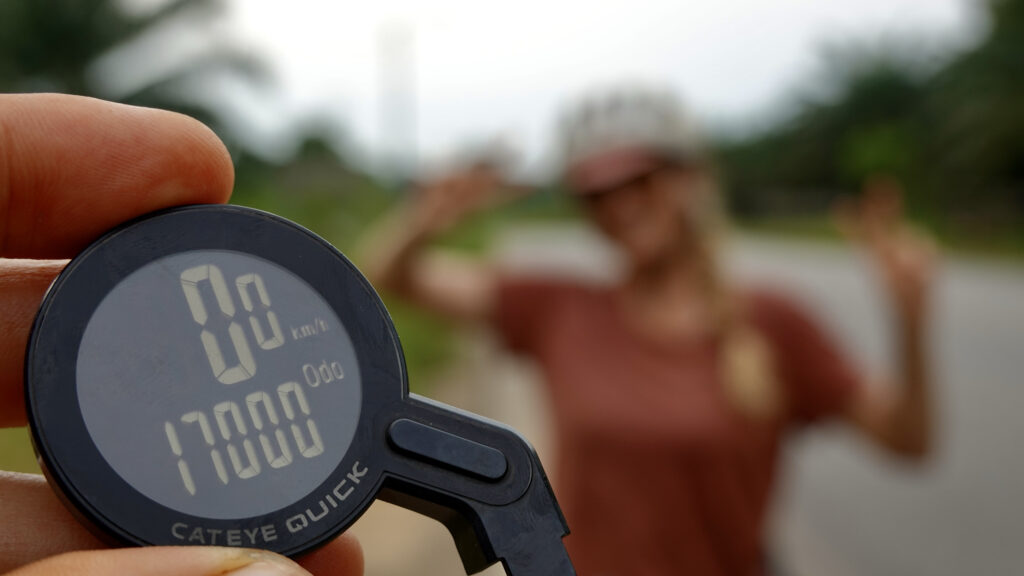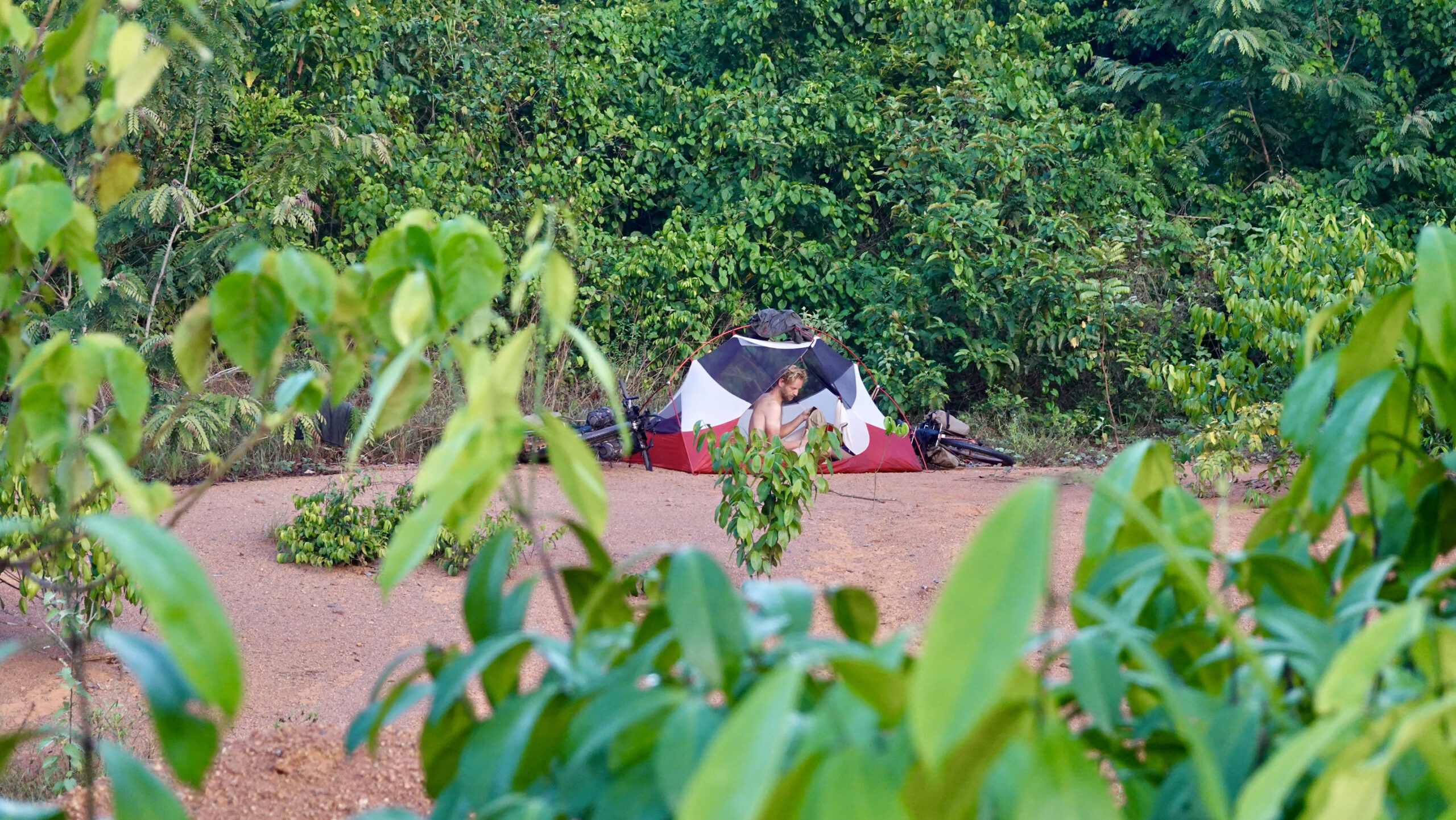In the Ivory Coast and up to Accra in Ghana, we decide to cycle more or less along the straight country road for two reasons. The rainy season is early this year and it's catching up with us, so we're trying to get out of there a bit. Once the sky opens its floodgates, we must seek shelter from the strong jets of water, and the dirt roads turn into mud baths. In addition, Marie must fly home from Accra to celebrate her niece's confirmation.
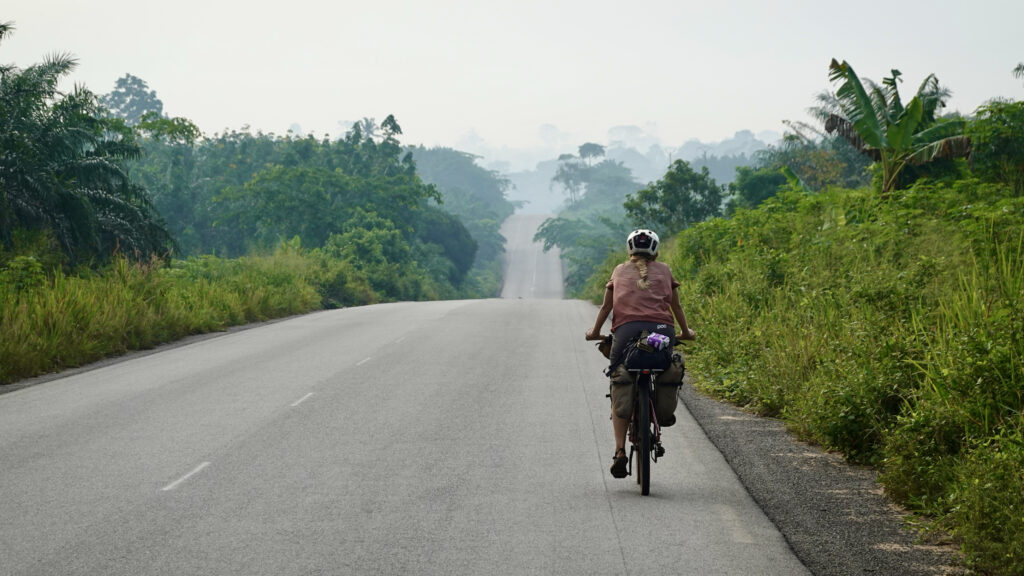
Ivory Coast – palm oil and heat wave
Where Liberia was under strong American influence, we in the Ivory Coast are back in a former French colony. The language and the croissants are obvious, but the country's cultural codes and political and economic situation are also very different. The landscape is also changing. The wild intense thick jungle with trees and plants twisted together like a natural plant wall in Liberia is gone. So are locals who walk around with a machete on their head to avoid being swallowed by the jungle.
Instead, our eyes meet long straight rows of coconut palms, huge palm oil plantations as far as the eye can see, rubber plantations and cocoa factories. We see people with hand sprayers and tractors. There is a more streamlined approach to farming and it is easy to see that there is more money in the country. It is estimated that 80% of all jungle has been cleared in Ivory Coast since the 1970s. A large part of the clearing is due to the fact that the Ivory Coast is a supplier of tropical timber, agriculture, and that there is illegal clearing in the jungle. Here, part of the forest area is cleared to produce cocoa, of which the Ivory Coast is the world's largest supplier.
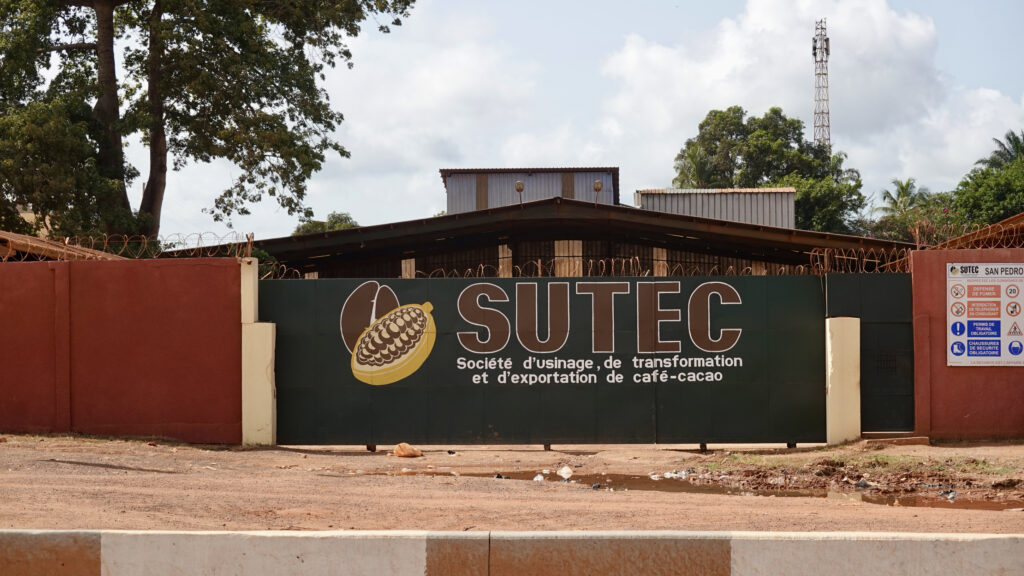
The most important industry in the country is still agriculture, but in recent years Ivory Coast has also started to export oil and gas and the country has West Africa's largest oil refinery, which also helps to ensure their economic progress. Unfortunately, there are not many countries in West Africa where they process the natural resources in the country, which means that they miss out on both jobs and higher income for the country.
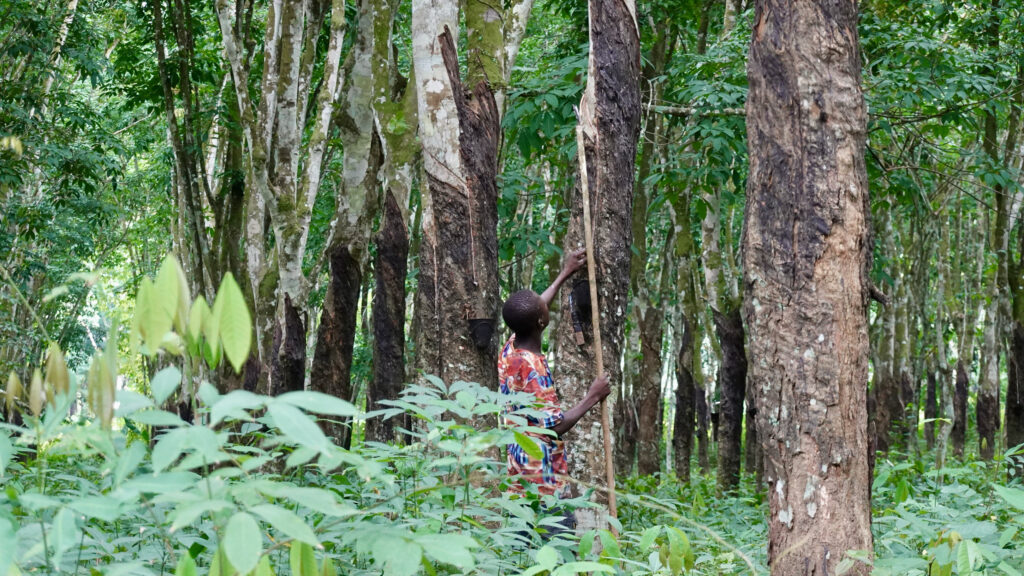
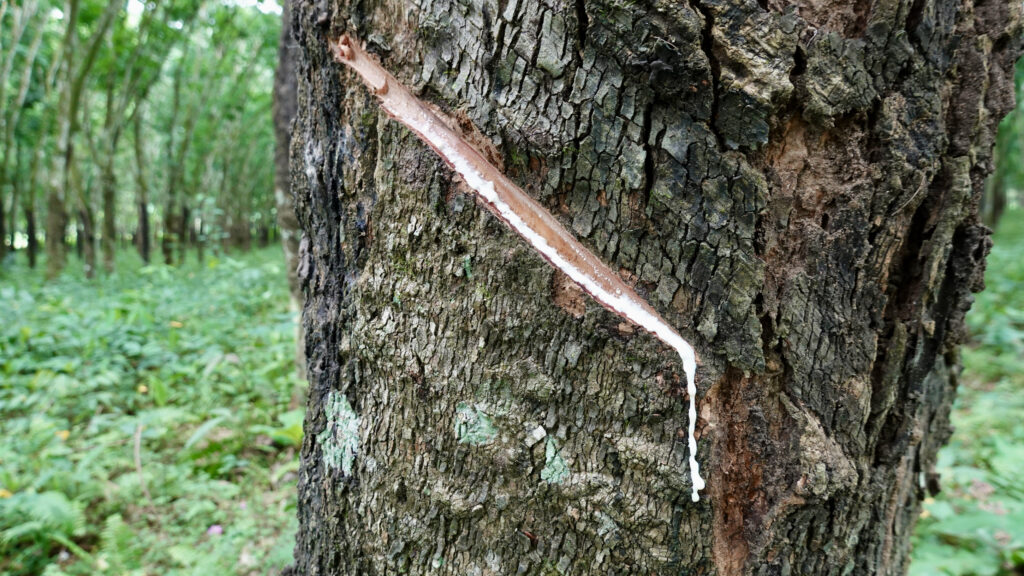
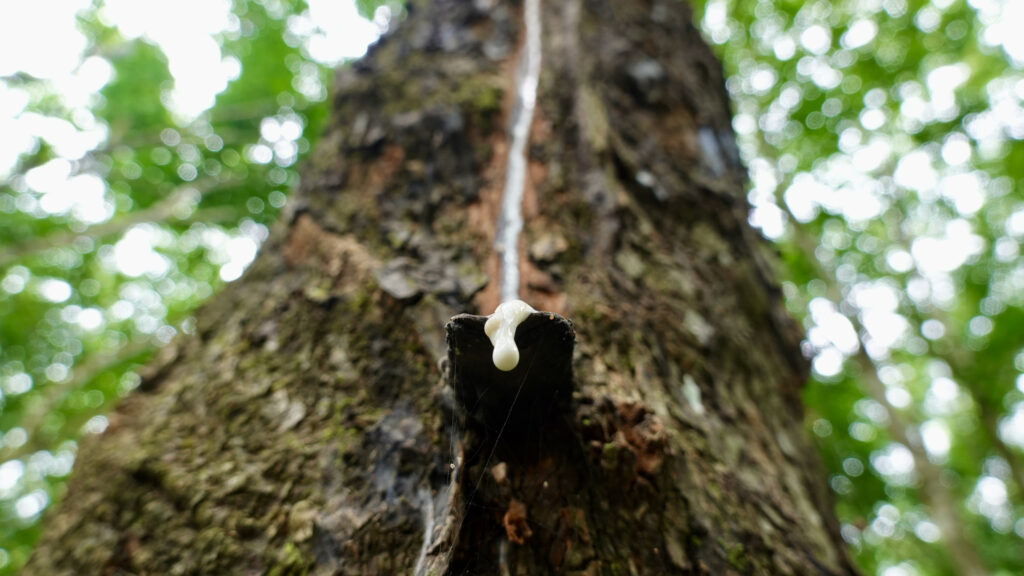
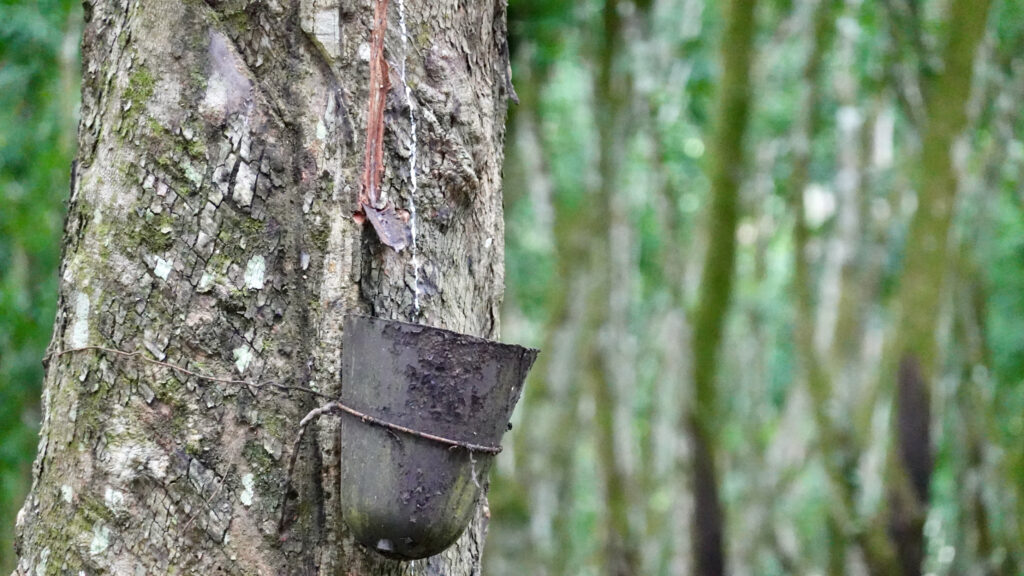
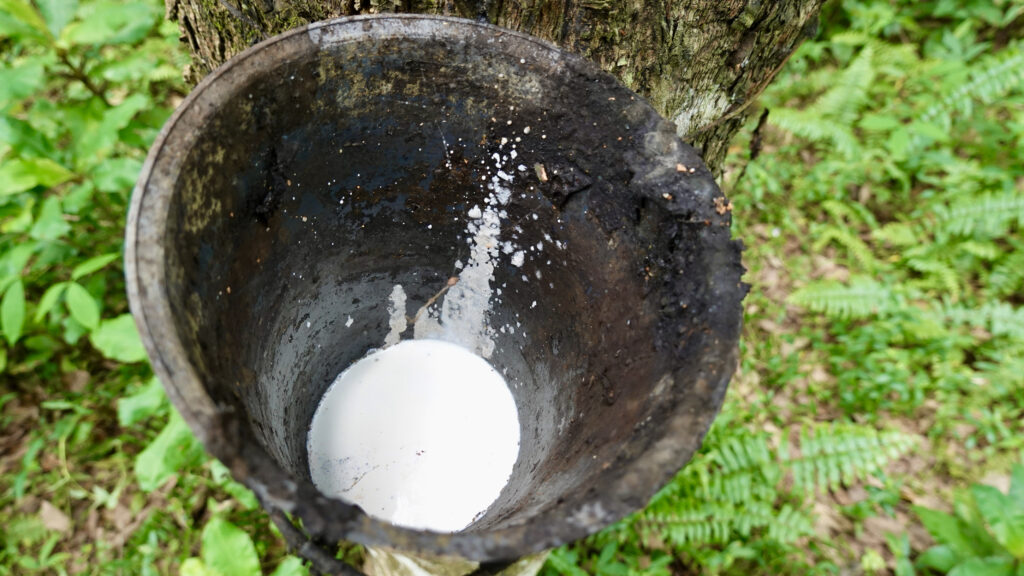
Tradition versus modern management
The large farms make it a bit more complicated to find a place for the tent at night. The first nights we set up the tent by the power poles that run along the road. Here the vegetation is cleared and we can find a flat place for the tent.
We also always think that it's fun to stay with the locals, so when one day we see that it's closed due to a huge palm plantation, we think that now is the time to find a place with some rooms to sleep. We think that it is no problem, since it has been easy until now, and in Liberia we met a man from the Ivory Coast who spoke very well of his country. "You can ask anywhere and you will get a place to sleep", he said. It sounds like sweet music to our ears and in line with the experiences we have had in West Africa so far.
So as the sun gets ready to shine on some others, we start looking for places to pitch the tent for the night. We see a school and think it will be a good place. We turn off to find someone to ask if it's ok. It turns out that the school is part of the surrounding plantation. There is a guard who tells us to find the boss and ask him. We cycle into the plantation area and come to a village where we ask for the village chief. A nice man is quick to understand what we want. It's not always that people fully agree with what we want when we explain that we have a tent, food and everything to spend the night. The tent in particular is not a concept people always know. The man speaks English and he wants to show us to the village chief. He must have just changed his undershirt with a nice T-shirt. He goes with us to the village chief and asks with interest about our journey.
The village chief lives in a house at the end of the village. We can feel that there is great respect for him. The clothes are just brushed off before we go inside. We can see that he is the boss by the fact that there is a huge freezer with cold bags of water in it. It is at a premium. Otherwise, there is not much else but the freezer and chairs and tables in the large room. We are seated on two chairs and the man begins to explain our inquiry. The boss's adult daughter is also there. She speaks good English and is completely on board with what we want. "You can set up the tent anywhere", she says. She is beautiful and we would like to talk more with her. The boss also says good for us. He just has to call and get it approved by the plantation owner.
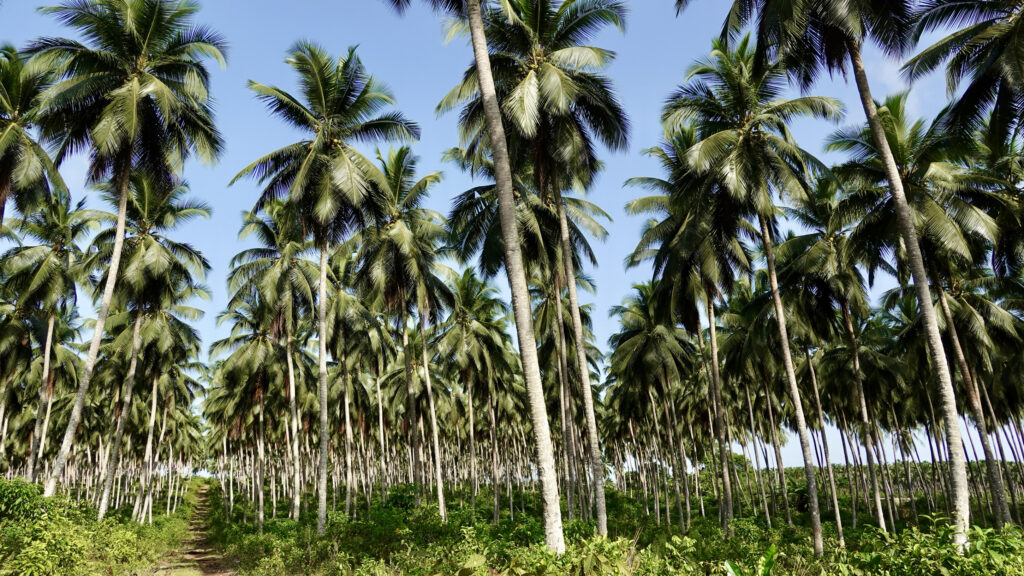
The mood is good and we think it's a formality. But when the boss calls, we can see in his facial expression that there are problems. The smile stiffens and the face takes on the wrong folds. He says; "daccord, daccord" and hangs up.
The boss and our friend are talking in a mixture of French and the local language, and we can understand that they are looking for other options. If they can hide us. The daughter is deeply disappointed and does not hide it. We are a little distressed to have put them in a bad situation. We can feel how the refusal goes against their traditions of welcoming strangers and the village chief's role as head of his village. We can imagine that there has been someone sitting at the other end of the line and not fully understanding it and thinking - we say no just to be safe.
We hasten to say thank you very much for the help and that we will easily find another place to sleep. It's getting dark, so we need to move quickly. The daughter is also well aware of this, and she looks towards the sun, which is about to set on the horizon. The plantation is huge, and now pitching the tent in it is definitely not an option. We step on the pedals and luckily further on there is a small path that goes down to a cassava field. Here we set up the tent for the night under a fine palm tree and watch the last rays of the sun disappear into the darkness while we eat our rice and sardines. Or i.e. Marie hides behind the mosquito net in the tent, as the mosquitoes love her very much.
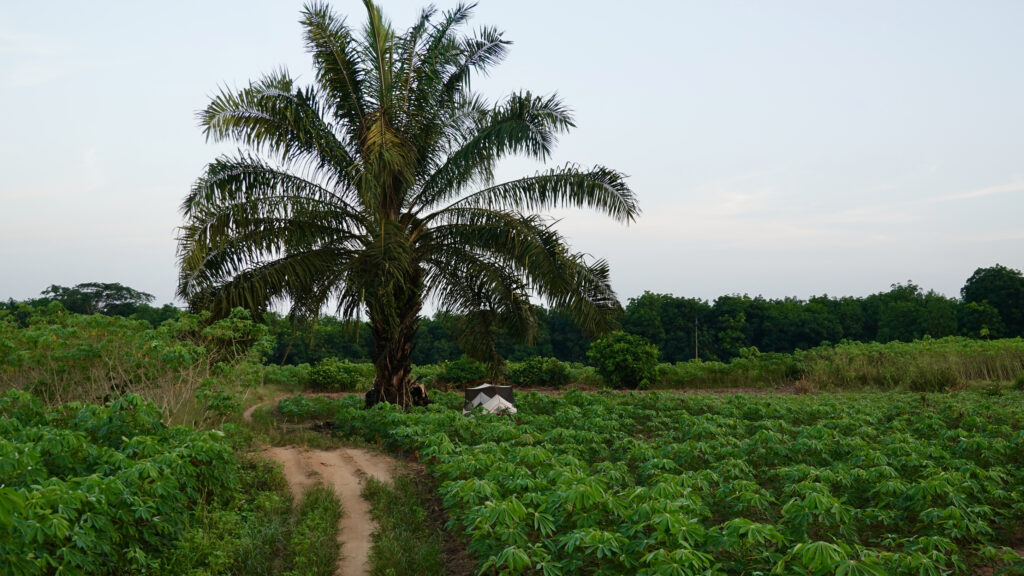
Our first scorpion
The next day, Kenneth hits the brakes and shouts excitedly: "Did you see that?". A giant scorpion runs across the road. Kenneth starts the really big photo session, while Marie thinks that Kenneth is just too close to it. Kenneth believes that it is the smaller scorpions that are more dangerous. The scorpion is huge - at least 15cm and with two large claws. It is fascinating how it manages to crawl down a ditch and back up the smooth concrete edge. So it's a little more peaceful with the many lizards scurrying around everywhere. In different colors. They seem to be quite fond of the bikes and are droning up and down on the tires or hanging out in the sun on the warm black saddle.
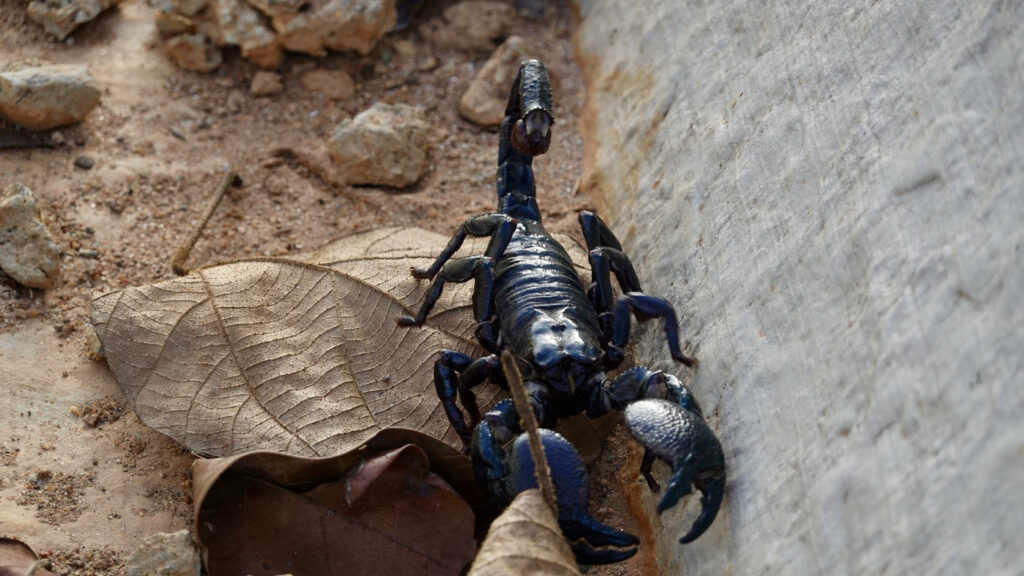
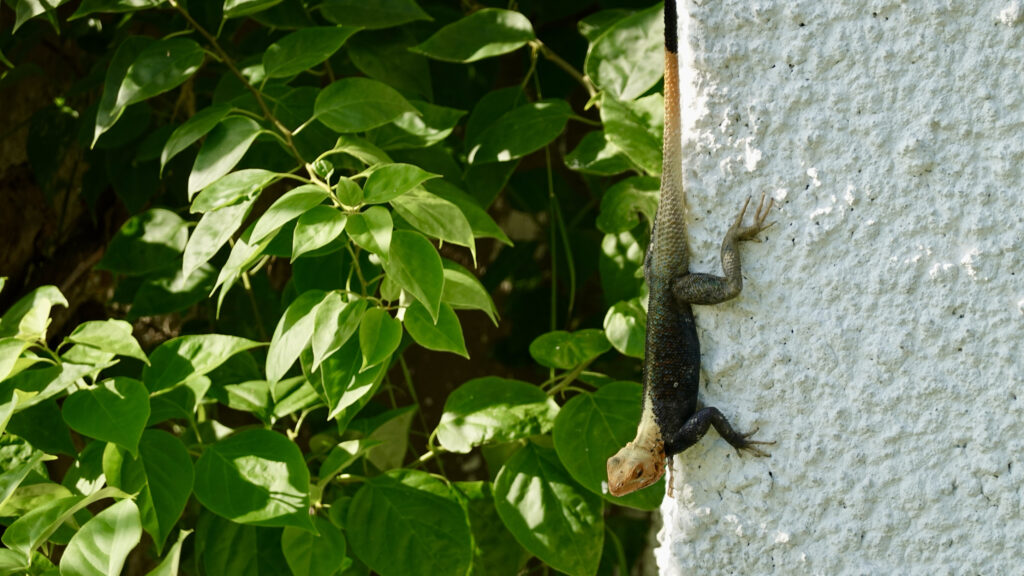
Thirst is quenched in coconut water
Ivory Coast has a tropical savannah climate with high humidity and high heat, and we feel it like we are bacon on a grill. The sun practically stings our skin, and we are constantly thirsty. We agree every day that we will take a break when the afternoon heat hits, but it never really works out for us.
We are trying to buy electrolytes at a pharmacy, but no luck. They have no idea what it is. Fortunately, we know clever Annika, who is a physiotherapist and cyclist, and she taught us that bananas and coconuts have the same function as electrolytes. They contain a natural composition of potassium, sodium and magnesium, which ensures that we don't just flush out the water we take in. The nature is fantastic. And it is useful new knowledge for us, because in the Ivory Coast it is easy to find fresh coconuts. There is often a woman or man standing by the roadside with a wheelbarrow filled with fresh coconuts. With a machete, a hole is made in the top of the nut, and we can drink the coconut water. Afterwards they open it and we can eat the fresh coconut meat. It tastes heavenly, and a coconut only costs DKK 3-5.
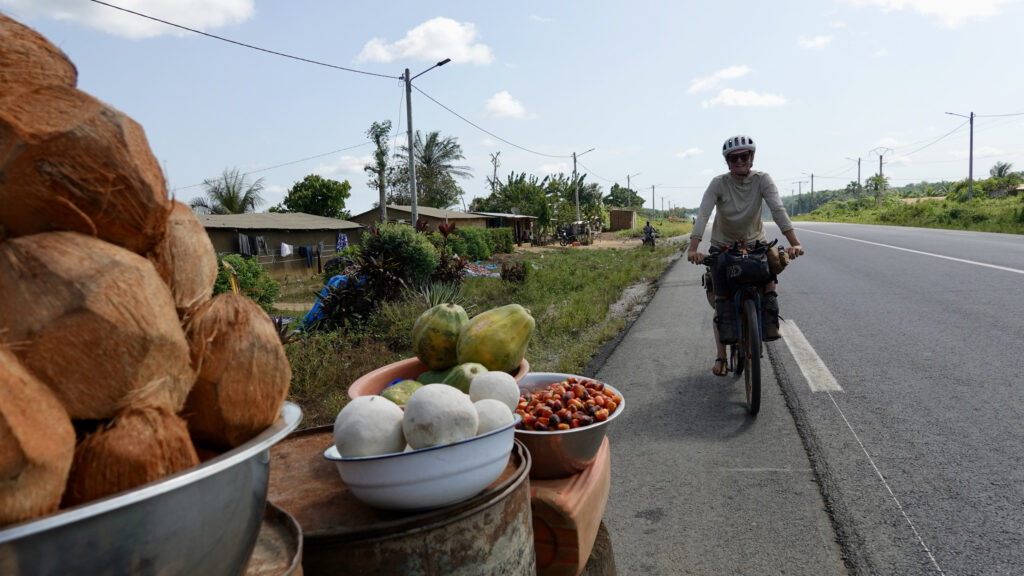
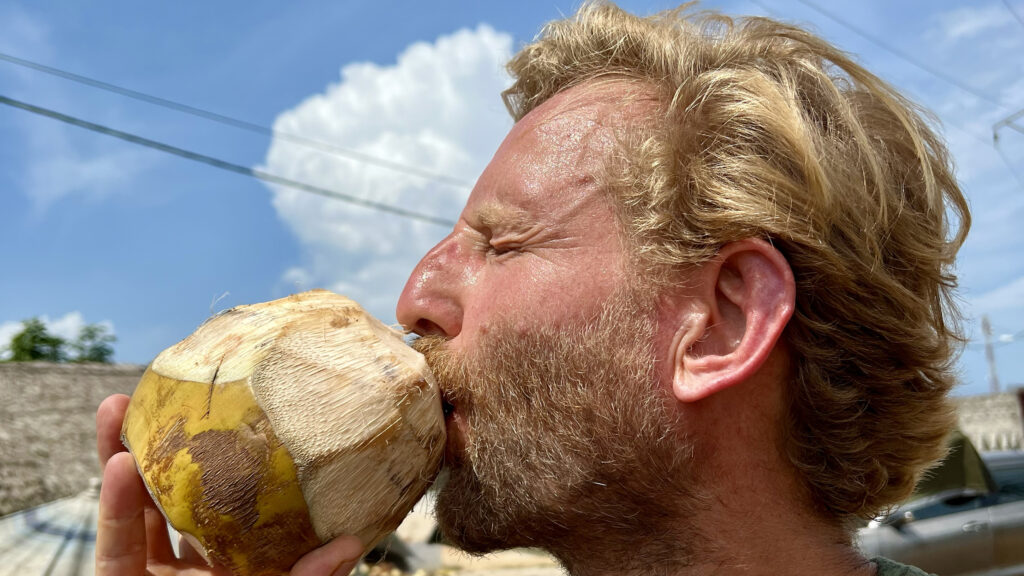
We also enjoy the small coffee shops in the towns that we pass. They are made super fine like a bar that you sit around. They serve coffee and omelette sandwiches, which we are big fans of, and it's a nice way to get into a dialogue with the locals. Bakers have also come back after many countries with a cake drought, which is definitely the former French influence at play here. The best thing is now the small roadside stalls where we can buy fresh fruit – papayas, coconuts, bananas, pineapples and sometimes oranges, which we haven't seen for a long time either. It is the best in the heat and simply so nice to have a little rest in the shade with the locals.
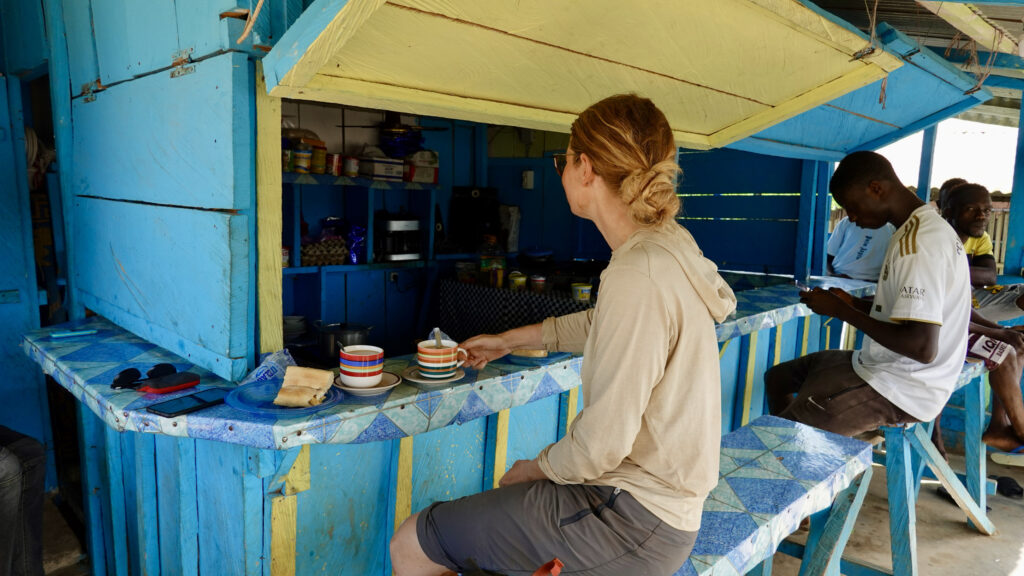
Ghana – Greatness and Decay
Ghana is a big surprise for us. In the guidebook, the country is described as 'Africa for beginners', and when we read about the country, it is political stability, a better economy and that the country is more developed that are emphasized. A country where tourists go to dip their bodies in the roaring Atlantic Ocean. A country known for its stability, which has been spared from civil war and has not experienced a coup since 1981, which is quite unique in West Africa. However, we find out that something is going on, and maybe the population's vision of never rebelling is not the luck either.
The first impression at the border is that it is all a little more professional with the scanning of passports and fingerprints – or is it because many of our border crossings have taken place through small borders in the countryside, but now we are on the main road at a major border post . At the border we are sent in to the boss to get our stamp. The office is a nice break from the heat, with air conditioning and nice furniture, which we settle in. There is another man sitting in the room, and they talk a little. The boss is friendly but measured. He starts with our passports and suddenly exclaims: 'Denmark – You bathe in ice in the winter', he says with a big laugh. The other guest looks at him very suspiciously. Kenneth grabs it immediately and agrees that we make a hole in the ice and bathe in it. Repeatedly. The boss nods towards the other guest in the room with a look that signals – what did I say. Nothing more is needed to lift the mood, and we quickly get our passports with a stamp and welcome to Ghana.
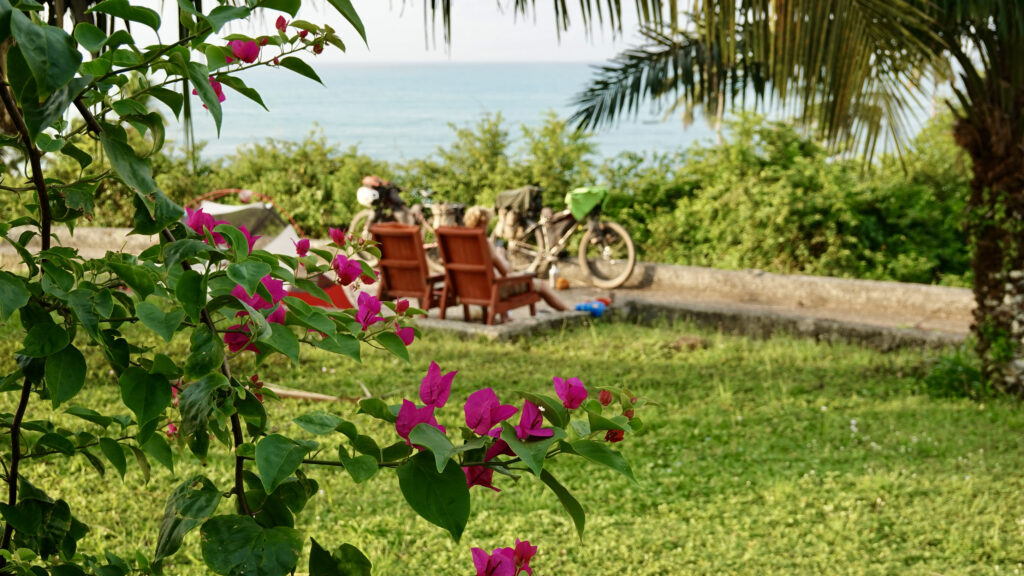
Spotted like a plaice
We've both had hot flashes for some time, but it's recently gone completely. We have red bumps almost all over our bodies. We also got some bumps that look like bites but are not mosquito bites. We know them. One evening it itches a lot, and we start talking about maybe it could be something other than hot spots? Maybe it's scabies or bed bugs? The images on Google of course match both, and it suddenly itches even more. We write to our sweet cycling friend, Peter, who is a nurse, and he doesn't think it's scabies based on the pictures. Phew! We decide anyway to swing past a hospital in Ghana. The process of being signed in, getting a huge booklet as a medical record and paying takes longer than talking to the doctor. But they're nice and we're glad they're taking us in. They quickly deny that it is scabies. So far so good. They don't think bed bugs are that common anymore in the country either... and we haven't seen any either. In return, they want to test us for malaria. Since Marie is not completely healthy, we have a test done. We both have malaria parasites in our blood, but the levels are so low that if we just keep taking the Malarone, we'll be fine. We don't learn about our bites, but come to the conclusion that maybe it was sand fleas that bit us. Our wise friend Peter suggests we take antihistamine for the hot flashes, and luckily it helps quickly.
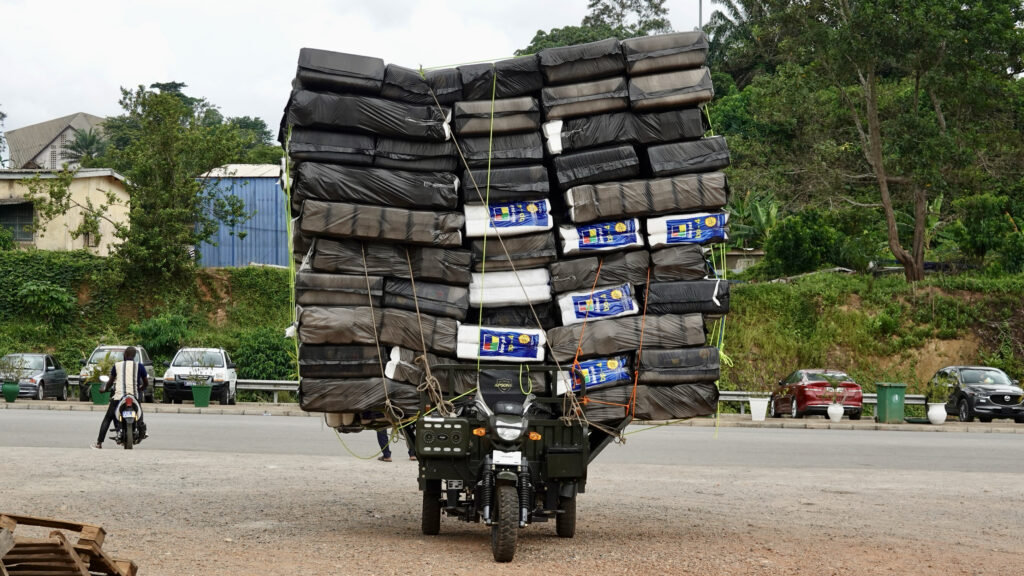
One man's bread is another man's death
In return, we learn more about Ghana. Before we leave the doctor asks if we drink the local water? We say that we get water from the local wells and filter the water. He looks authoritatively at us and says that he would not recommend us to do that in Ghana. There is so much illegal mining that the groundwater is polluted. In the long run, Ghana will have to buy drinking water from outside, he continues gloomily with a serious and almost resigned expression on his face. He says that it is the Chinese who do illegal mining. How one of the farmers who asked questions about mining ended up here in the hospital. At this point we have been in Ghana for a few hours.
Illegal mining and its consequences is a recurring theme in our conversations with locals and foreigners living in Ghana. Illegal mining takes place in two ways. There are local Ghanaians looking for gold. It is often on a smaller scale, but very polluting for groundwater and devastating for agriculture. We saw some young men in rubber boots standing in a mud pit close to the road to the sound of generators running at full power. We asked what they were doing and they yelled back 'illegal mining' with a huge laugh. It didn't take long before a man came and waved us away with large movements of his arms. So even if it's illegal, at least it's not invisible. In addition, the Chinese do illegal mining, which is much more organized and which poses the biggest threat to the country.
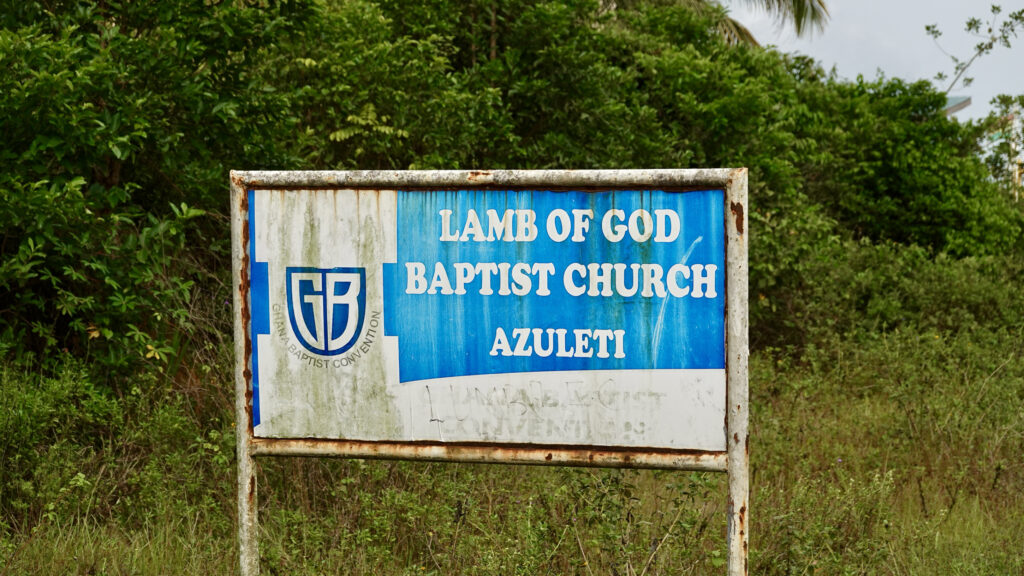
We cycle further into the country, and we feel a slightly tense atmosphere. A kind of desperation. It is so clear to feel that many are dissatisfied. That there is something more hidden behind the smile.
We have many conversations with locals and foreigners who live in the country about how things are in Ghana. We live i.a. with a wonderful French woman; Danielle, in Busua, which is a small cozy surfer town. Danielle and her husband built a hotel 21 years ago, which she still runs after her husband passed away. She tells how she can feel the change in the country. The high inflation and high unemployment. She also mentions the illegal mining and how it destroys agriculture and cocoa production. The entire 30% of the cocoa mass exported to Europe has been rejected due to excessive content of poison (from mining). The tourism industry has also had some tough years both during and after the pandemic. Danielle adds that even more tourists will want to visit Ghana if they can get a visa when they arrive in the country instead of applying in advance and paying for it. She cites Senegal as an example. Here they had also introduced that you had to apply for visas in advance, but when they experienced a large drop in the number of tourists, they changed it again. In general, many industries are challenged and many find it difficult to cope. There is officially 75% unemployment in Ghana and many live off unofficial jobs.
We hear the same thing while having lunch in a small town. We strike up a conversation with a man who asks where we are from. When we say Denmark, he exclaims: "It's my favorite country!". Kenneth asks him what he likes best about Denmark. It turns out, not surprisingly, that he knows nothing about Denmark, but he is sharp and says that Denmark is the symbol of the dream of a better life. As we have heard in almost all the countries in West Africa, the people miss visionary leaders who want the best for the people instead of lining their own pockets. He talks about the hopelessness he experiences and that he cannot see a future for himself in Ghana. It is difficult to get a job and finances to support a family. He points to the worn asphalt road and says that there is no development. We think the road is fine compared to some of the other countries, but it is clear that when the country has previously been in economic progress, and the government has promised development, then it is a decline. We try to challenge him that it might not be luck to come to Denmark either, and that it is better for him to stay in Ghana and fight for a change in the state of things. He shakes his head and it is clear that he has given up. He is also certainly not a fan of the sitting president, who he does not think has lived up to his election promises. So he is quite satisfied that there are elections in December. It turns into a longer conversation and more perspectives on life in Ghana. It is not black and white, but filled with as many nuances as a color palette. As we speak, the woman who ran the small food stand gives a homeless person free food and a bag of water.
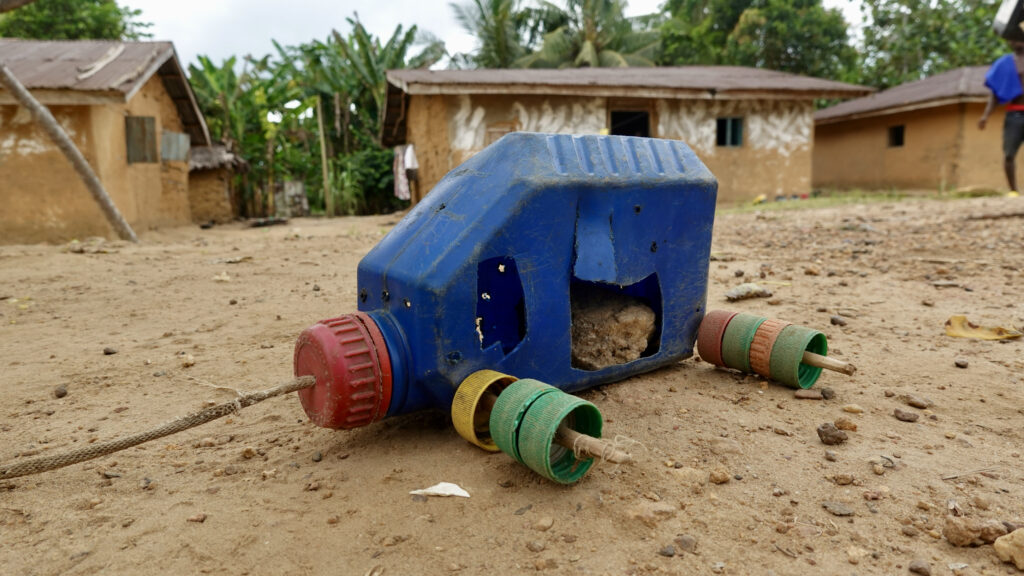
Overnight at a gas station
We have chosen a nice place on the coast, which we are trying to reach, for the night's accommodation. But it doesn't always go as planned. We cycle off in a heat wave and are completely happy when we see a fruit stand. We buy a pineapple and the woman at the road stall is kind enough to cut it for us. It is sweet, juicy and tastes heavenly. As we sit in the shade and look out at the sky, we can see that it is starting to contract a little. We probably won't avoid rain today, we agree. When we get back on the bikes, after a while we can see that it is raining on the horizon and much sooner than expected, it starts to drip on us. We turn into a petrol station and it starts to come down in thigh-thick jets. We look at each other and then at a garage that is an extension of the gas station. We ask the women if there is somewhere we can pitch a tent for the night and she points to the garage. "You are welcome to sleep there", she says. We feel like we've hit the jackpot. We just need to move some tires and an old car seat, and we need to stop falling into the mechanics pit, then it's a perfect place to stay. At least it's dry. What we don't anticipate is that there will be trucks parked overnight, which will be kept idle, that there will be a disco opposite with loud music most of the night, that a couple of motorbikes and a moto-taxi will be parked inside the garage, which then will be picked up in the middle of the night. Or that the night watchman sleeps a few meters from us in the old car seat, and that we will wake up to a young boy sitting on a bench in the garage listening to old American love pop numbers at 6 in the morning. We didn't sleep much, but it's never boring at a gas station.
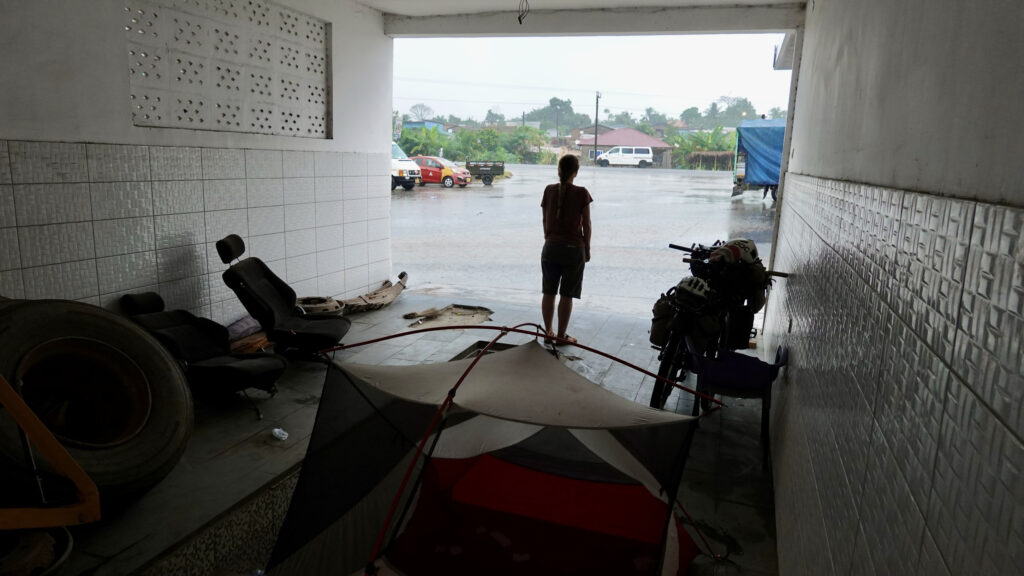
The Gold Coast and Ghana's largest slave fort
In Ghana, we stop in Cape Coast, where we visit the country's largest former slave fort. It is located on the coast and this is where the slaves were traded, stored and sent on the ships across the Atlantic. The fort started as a trading fort dealing in gold and ivory, but over time the slave trade became dominant. It was built by the Swedes, the Danes took it over for a short period, then the Portuguese and Dutch struck, and finally the fort came under British control in the 1660s. The fort became their headquarters on the Gold Coast, and it is after their takeover that the slave trade took off. We are given a tour of the fort by a guide. We are the only white people in the otherwise large group of visitors, and it is hard not to feel a little uncomfortable. It is absolutely horrible how people have been treated here.
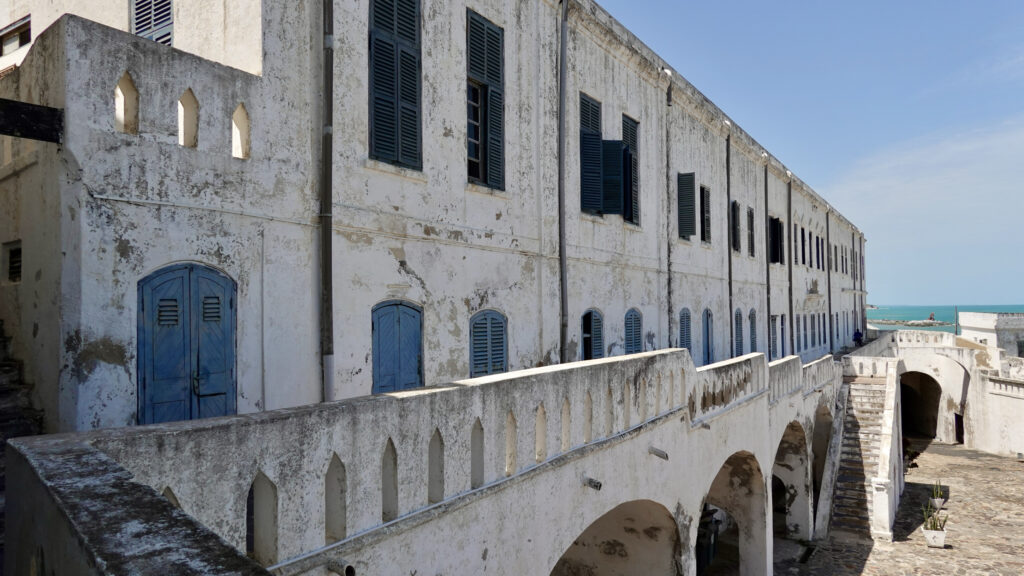
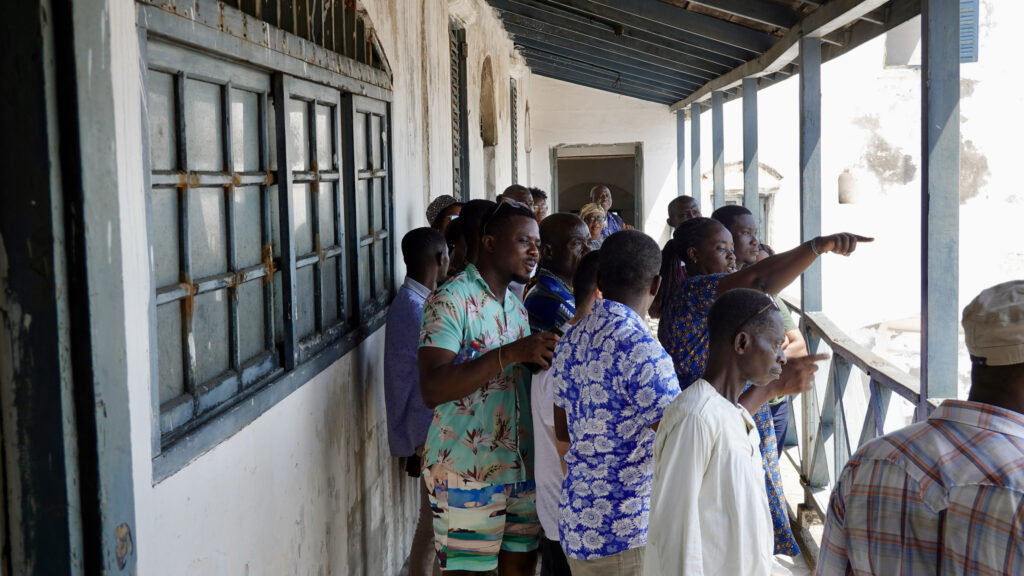
The guide is a fantastic communicator. She narrates vividly, dramatically and amps up the emotional stories about the slave fort. Both in the way she presents the stories and how she involves the participants by, for example, everyone going into a prison cell and the lights being turned off. Several of the others in the group are clearly affected, and they almost live through what the slaves went through. One woman in particular is very affected by it. At one point, she walks up to Kenneth and looks him straight in the eyes while asking: "How does it make you feel?" It's a bit difficult to get back on, but Kenneth asks her what she means, and she pulls back a bit.
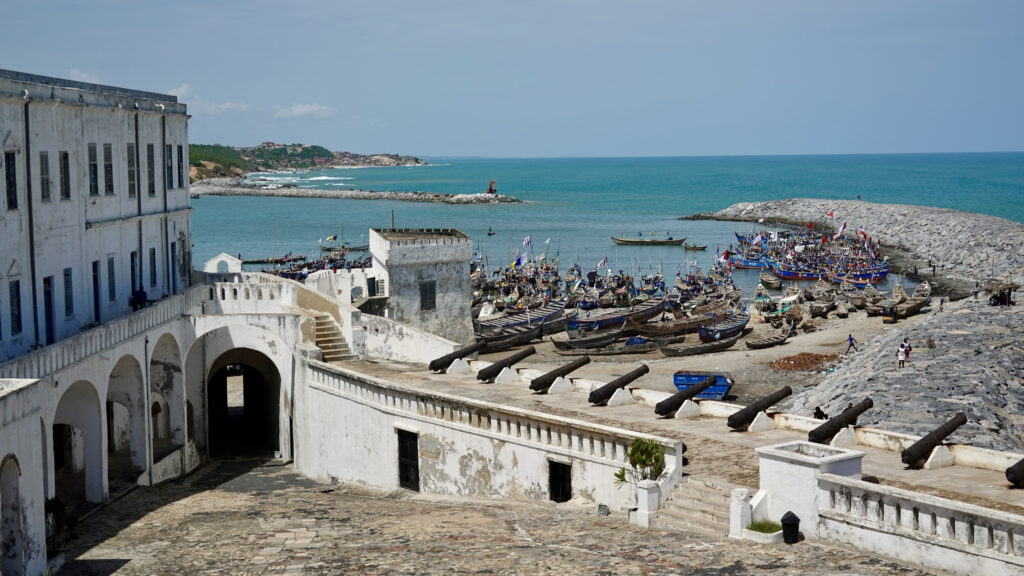
The Danes also did the slave trade in Ghana, but further east in the capital, Accra. Here they had control over the fort Christiansborg, from where we sent an estimated 100,000 slaves to the sugar cane plantations in the Danish West Indies, until Denmark sold its colonies in the Caribbean in 1850. Today the fort is called Osu Castle and functioned until 2013 as the presidential palace. In Accra, we met a team from DR, which is making a documentary series about this dark period in Denmark's history. It is a period that we don't hear much about, so we are very much looking forward to watching the documentary series and learning more.
We think it is important to know the history of the countries we travel in, and in this case it is really interesting to have a guide to tell it. There are many ways countries process their trauma. In Germany and Europe it is information, so we ensure that World War II will hopefully never happen again. In Colombia we saw that the past is hidden away to focus on the future, but here it seems that the past is emotionally cultivated in order to process it. There is no right and wrong, but it is exciting to experience how different cultures work.
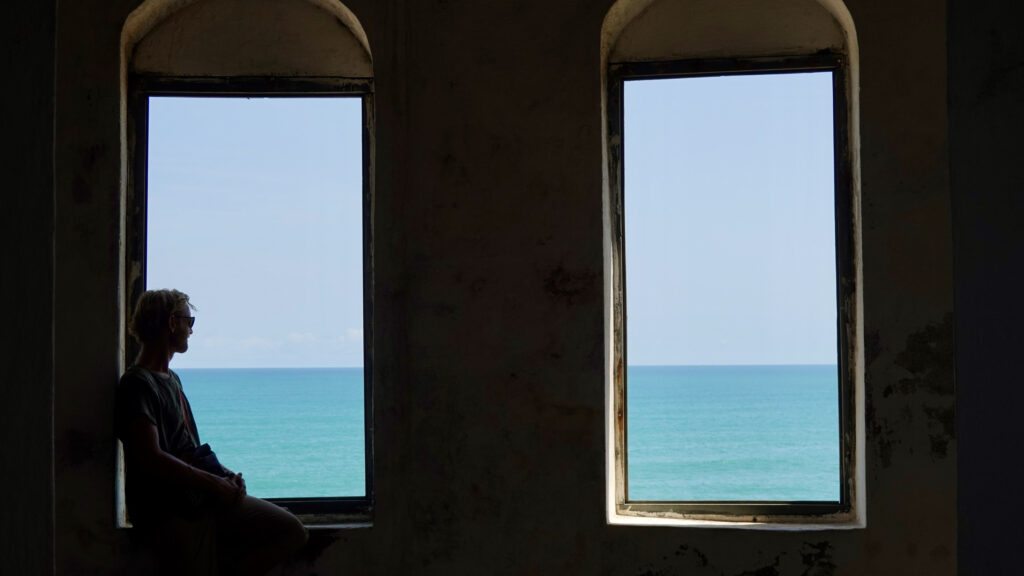
Accra – visit to the Danish embassy
After a few intense days on the main road with our hearts in our throats, we reach the capital Accra. Over time, we have cycled into many capitals and huge cities, but the road to Accra takes its toll. Several times we are driven off the road. There is a different temperament here. More aggressive and selfish. People also drive fast in the other countries, but there is something more at stake here. Kenneth suggests that this is because 99% of the drivers are young men. There are no elderly or women behind the wheel, and we can almost feel the young men's experience of being immortal. Because they certainly don't do it on purpose.
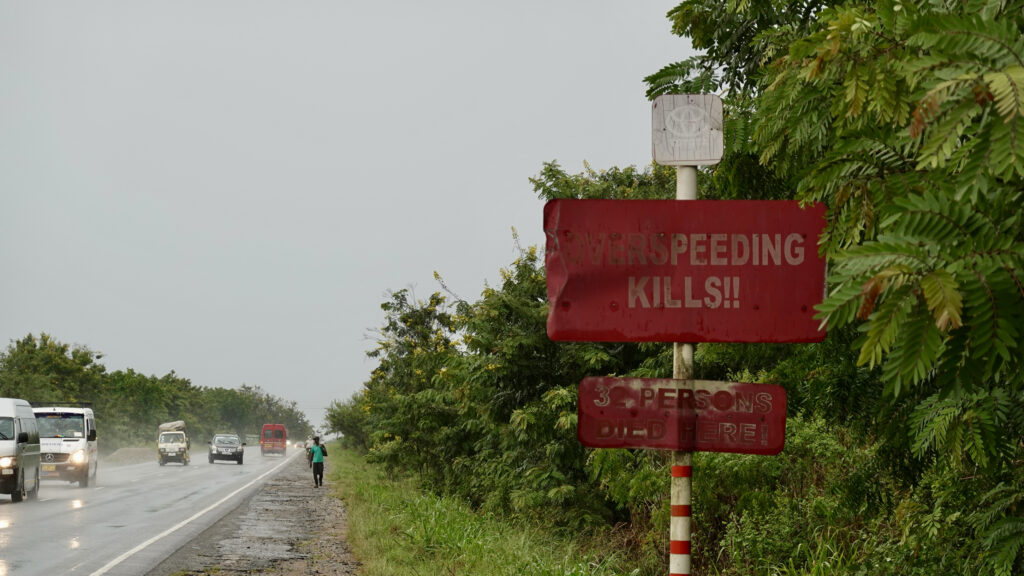
At one point, Marie is run off the road by a truck, while the driver's friend hangs out the window with a big smile and a wave. He is somewhat disappointed when Marie shouts at him, instead of smiling back.
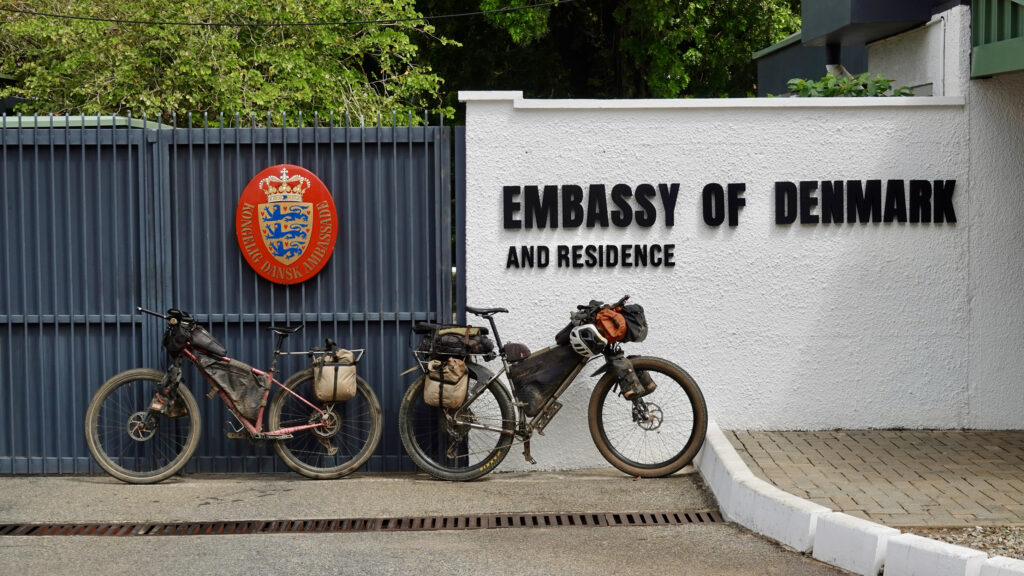
In Accra, we decide to contact Anne Marie at the Danish embassy, with whom we were in dialogue when Marie's bag was stolen in Monrovia. It will be fantastic to meet her and visit the Danish embassy and hear more about their work in Ghana. We are invited for coffee and croissants at the embassy the following day at 10. When we turn the corner and see the Danish flag waving in the wind, and the Danish sign on the embassy door, our hearts warm. And when we sit in Danish design and pour coffee into the cup from a Stelton jug, we almost feel at home. We have an interesting talk about Ghana and its future. How the economic crisis affects international companies not wanting to invest in the country, starting a downward spiral. How China does not have a problem with giving gifts to the senior politicians, while it is not an approach that Europe works with. When China builds roads, they bring everything from China – workers, machinery, food, barracks, etc., and when they go home, they take everything with them. Here, Europe's approach is to use as much from the country as possible – material, labor and leave the machines standing, so that there is something to work with afterwards. On the other hand, the Chinese are lightning fast, and that is appreciated by some higher ups – at least until an election where votes have to be split. We also learn how the public servants earn a salary that makes it difficult for them to provide for their families, which is why it is so difficult to break corruption at all levels. Again we are confirmed that it is not clear what is right and wrong.
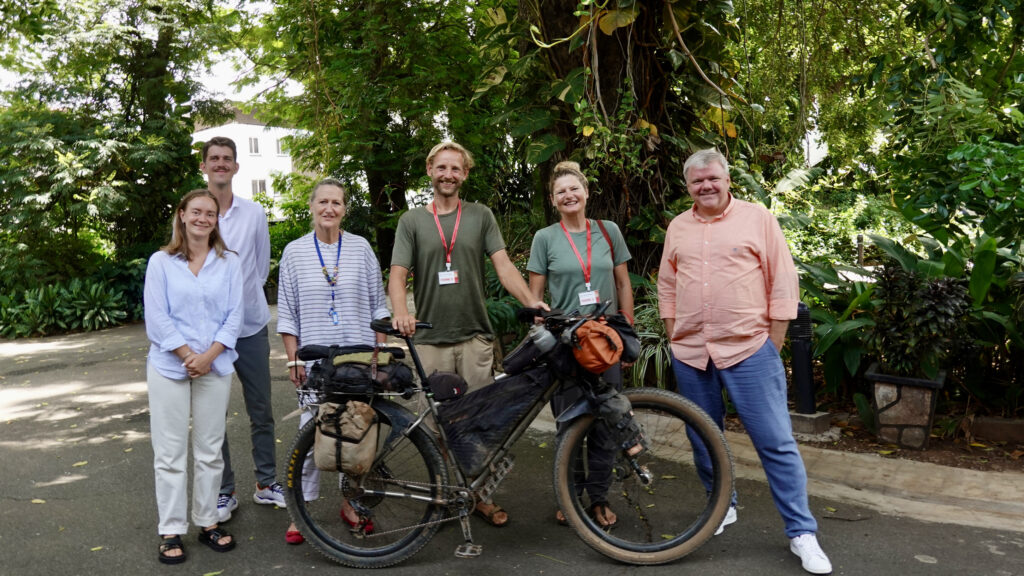
Reunion kiss at the airport
We cycle through the Ivory Coast and to Ghana on the straight country road, with only a single detour in Ghana on a bit of singletrack and a nice gravel road along the coast, where we feel in a familiar environment. The straight country road is a contrast to the way we normally cycle, where we put the experiences first and see where they take us. Preferably on the small roads, where the big tires come into their own.
We think that the experiences are fewer in the Ivory Coast and in Ghana, but we are also very aware that it has to do with our chosen route and our own attitude. We were on track to reach Accra in time for Marie to fly home to celebrate her niece's confirmation. And we have to admit that the best experiences for us lie far from the main road and when we take the time to reflect.
For a while, Marie is at home in Denmark, while Kenneth continues cycling, so that we can keep to the overall schedule. But we will meet again before long and continue the adventure together to South Africa.
